Automated schema markup generation is revolutionizing the way websites improve search engine visibility.
But what exactly does this process entail?
This comprehensive guide offers a deep dive into automating schema markup generation and how it can skyrocket your SEO performance.
Some are leveraging AI to reduce errors and save time.
Some are integrating schema into CMS platforms seamlessly.
Some are using sophisticated tools that dynamically update markup as content changes.
Some are scaling schema implementation across thousands of pages effortlessly.
Some are gaining rich snippets and enhanced SERP features with little manual intervention.
Let's dive right in.
What Is Automated Schema Markup Generation and Why Does It Matter?
TL;DR: Automated schema markup generation uses AI-powered tools to create and deploy structured data on websites automatically. This boosts your SEO by improving search engines’ understanding of your content and enabling rich results.
Schema markup is a specialized form of structured data. It gives search engines explicit clues about the content on your web pages, helping them display enhanced results such as rich snippets, knowledge panels, and more.
The traditional method requires manually coding schema in JSON-LD or other formats, which is time-consuming and prone to errors, especially on large sites. Automated schema markup generation eliminates these hurdles by using artificial intelligence and machine learning to analyze page content, detect the most relevant schema types, and generate precise code that can be deployed instantly across your website.
AI tools assess elements like articles, products, reviews, local business details, events, and FAQs, matching content with the ideal Schema.org types seamlessly. This automation reduces human error, ensures consistency, and accelerates implementation dramatically.
With over 850 schema types available, automation helps marketers and SEO professionals target the right schemas for each page, optimizing search intent alignment and increasing visibility in search results.[Source] For example, an e-commerce product page might automatically receive Product and Review schemas, while a recipe page gets Recipe schema with cooking time and ingredients information.
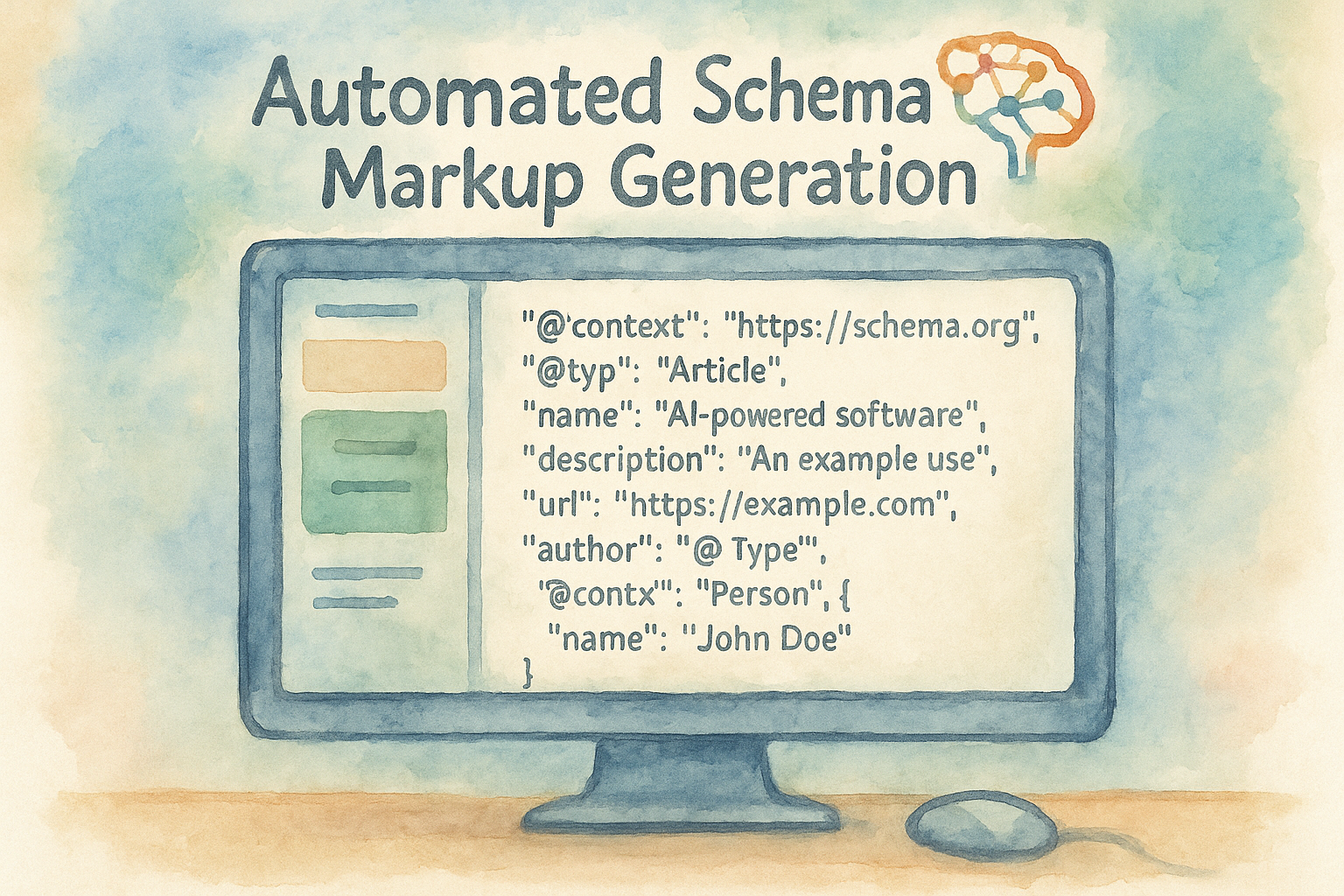
This technology is especially valuable for agencies or businesses with large or multi-domain websites who need to maintain accurate, up-to-date structured data without constant manual coding. In fact, automating schema markup deployment has become an essential strategy for efficient SEO operations and scaling organic search performance.[Source]
How Does Automated Schema Markup Generation Work in Practice?
At its core, automated schema markup generation involves several key steps, powered by AI and semantic technologies:
- Content Analysis: AI algorithms crawl your site and analyze each page’s content to understand the entities, their relationships, and context.
- Schema Type Selection: The system determines which Schema.org types apply best—for instance, Article, LocalBusiness, Product, or Event—based on the page’s purpose and content.
- Markup Creation: JSON-LD code is generated dynamically to embed the relevant schema properties and nested structures that describe complex content accurately.
- Integration and Deployment: Tools often inject schema markup via JavaScript tags, CMS plugins, or API calls, deploying the markup without the need to manually edit HTML code on each page.
- Validation and Monitoring: Automated checks ensure the structured data is error-free and compliant with search engine guidelines. Ongoing monitoring alerts teams to schema errors or deprecated tags arising from content or vocabulary changes.
This pipeline ensures schema markup remains consistently aligned with changing content and SEO requirements. For example, Sitecore CMS users can leverage integrated solutions like Schema App, which employs a highlighter tool to map page elements to schema properties and dynamically update markup as content evolves.[Source] This reduces manual workload and helps enterprises stay agile in complex environments.
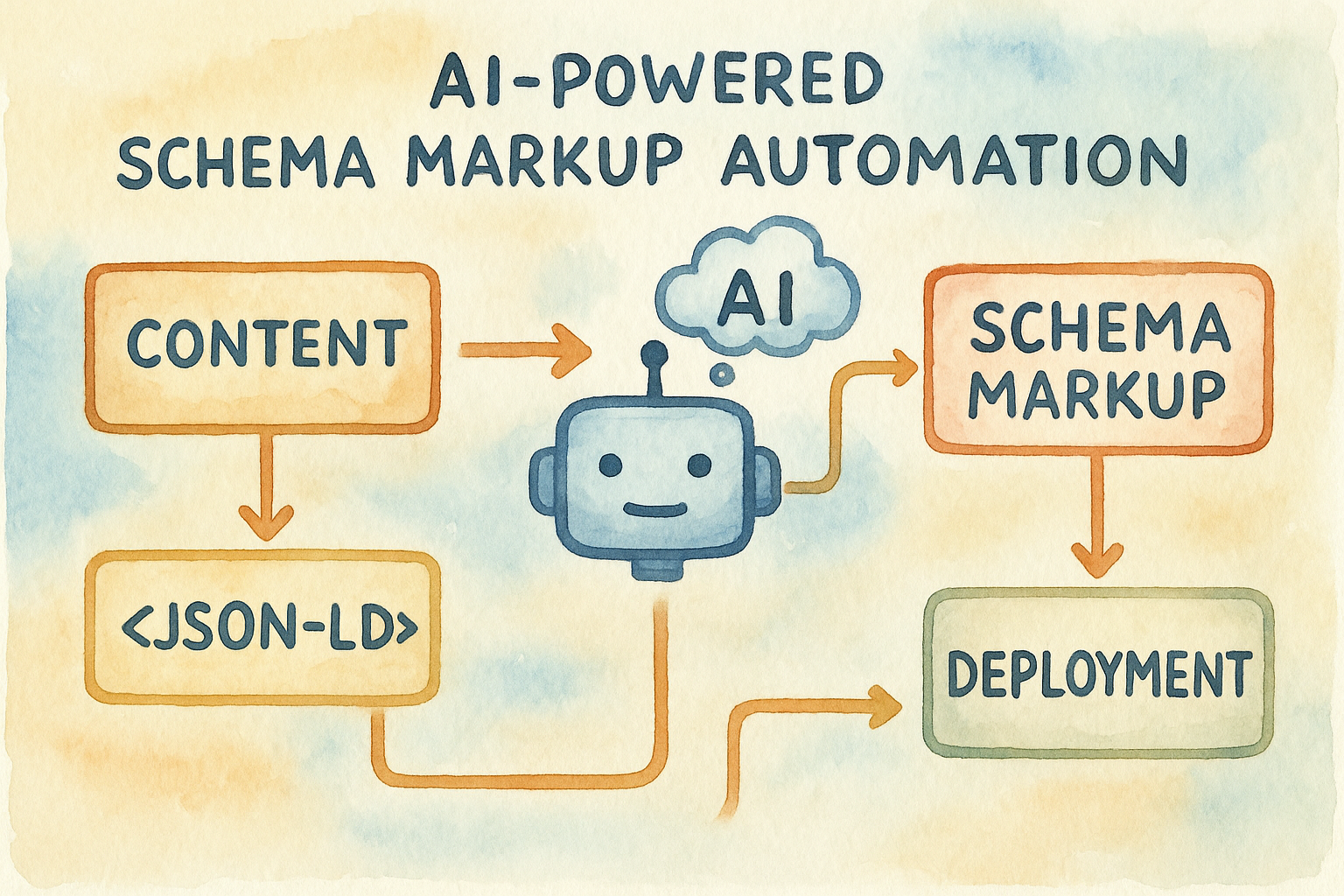
Moreover, these systems often utilize nested schema types, meaning they not only annotate primary entities but also their attributes and context, creating comprehensive semantic data enhancing search engine comprehension.[Source] This complexity is virtually impossible to manage manually at scale and highlights the transformational impact of automation.
Why Should Businesses Invest in Automating Schema Markup?
Automating schema markup generation is not just an efficiency play—it drives tangible SEO and business benefits that justify the investment.
- Scalability: Whether managing dozens or thousands of pages, automation applies accurate schema across your entire site swiftly. Companies handling multiple domains or clients benefit massively from time saved.
- Error Reduction: Manual schema coding is prone to syntax errors, deprecated tags, or incorrect schema types. Automation minimizes these issues, ensuring search engines receive clean, valid markup.(Verified with sources as of 2025-09-11)
- Rich Result Opportunities: Automated schema highlights critical content features such as reviews, products, and events that trigger rich snippets or knowledge panels. This increases click-through rates (CTR) and drives qualified organic traffic.
- SEO Strategy Focus: By taking schema deployment off your technical to-do list, your marketing and SEO teams can concentrate on strategic initiatives—content optimization, link building, and user experience.
- Continuous Updates: Website content changes constantly. Automated tools dynamically adjust schema markup to reflect updates without manual intervention, maintaining schema relevancy and search visibility.
- Competitive Advantage: As search engines increasingly leverage structured data for AI-driven answers, investing early in robust, automated schema positions your brand ahead of competitors who rely on outdated or partial markup.
In short, automated schema markup generation is a game-changer for boosting organic search presence efficiently and accurately.[Source]
How Can You Get Started with Automated Schema Markup Generation?
Launching an automated schema markup strategy requires a combination of selecting the right tools, designating clear goals, and thorough site analysis.
Here’s a detailed step-by-step approach:
- Assess Your Website’s Content and SEO Goals: Begin by auditing your site to identify pages that will most benefit from structured data—product pages, blog posts, local business listings, FAQs, recipes, etc.
- Choose an Automation Tool or Solution: Opt for platforms that offer AI-driven schema markup generation. Examples include Milestone Schema Manager, Schema App, among others. Look for solutions compatible with your content management system, whether it’s Sitecore, WordPress, or custom-built.[Source]
- Define Your Schema Markup Strategy: Work with your SEO team or tool provider to specify which schema types and properties align best with your content and business objectives.
- Implement and Integrate: Deploy the automation tool, often via a JavaScript tag or plugin, to start generating and embedding schema on your site pages automatically.
- Validate the Markup: Use tools such as Google’s Rich Results Test to check deployed markup for errors and warnings. Automated tools typically include validation features.
- Monitor and Optimize Continuously: Schema markup is not a set-it-and-forget-it task. Set up ongoing monitoring to track schema integrity and performance metrics tied to organic traffic and search result enhancements.
For enterprise CMS users like Sitecore, partnering with dedicated schema platforms provides tailored integration and ongoing support, including dynamic updating and content knowledge graph building.[Source]
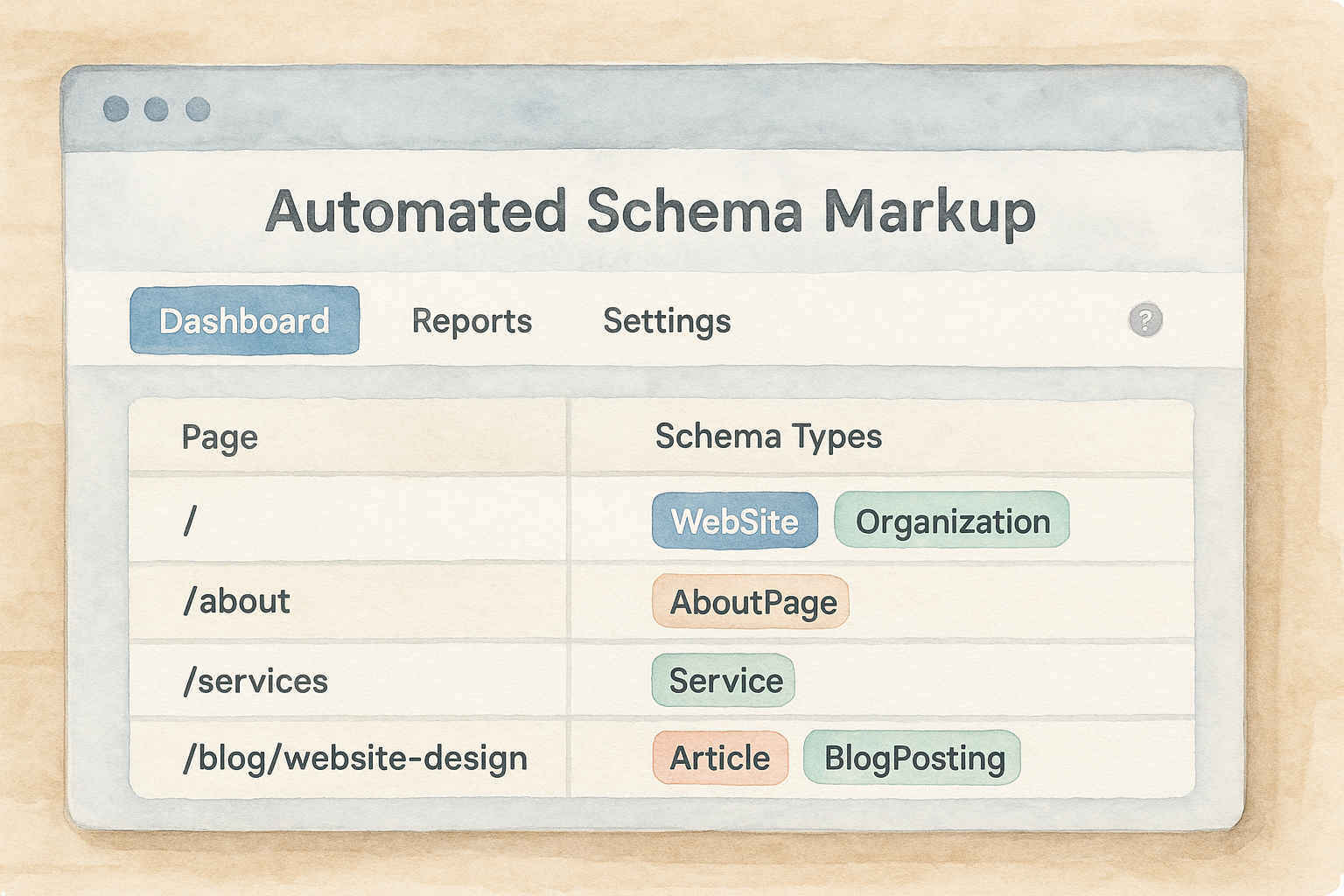
What Are the Common Challenges in Automated Schema Markup Generation?
While automation eases schema deployment significantly, challenges remain that businesses should be prepared for:
- Choosing the Right Schema Types: Not every schema fits all content. Automated systems rely on accurate content analysis and predefined business goals to apply appropriate schemas correctly. Misclassification can mislead search engines.
- Keeping up With Schema.org Updates: Schema vocabulary evolves rapidly. Automation tools must update frequently to accommodate new types and deprecated properties, or risk losing compliance.
- Complex Site Structures: Large websites with dynamic content or diverse page types require sophisticated schema nesting and customization. Automation platforms must support nested and advanced schema attributes.
- Cross-Platform Compatibility: Different search engines and AI tools interpret schema data differently. Ensuring your markup works universally can be tricky.
- Integration With CMS and Tech Stack: Not all automation tools integrate seamlessly with every CMS. Technical setup can require developer input, especially for custom platforms.
- Continuous Monitoring & Maintenance: As pages update or content shifts, schema may become outdated or generate errors. Automated error detection and workflow alerts are critical.
Professional automated schema solutions like Milestone Schema Manager address many of these issues by offering no-code, managed services that include deployment, validation, and ongoing corrections to keep your structured data error-free and SEO-compliant.[Source]
How Does Automated Schema Markup Improve SEO Performance?
By implementing automated schema markup, websites can unlock several SEO advantages that directly impact growth and visibility:
- Enhanced Search Appearance: Schema enables rich snippets such as star ratings, product availability, event times, and FAQs that make your listings more eye-catching on search engine results pages (SERPs), increasing click-through rates.
- Improved Indexing: Structured data helps search engines correctly interpret and index your content, improving relevancy and rank potential for targeted queries.
- Entity Recognition and Knowledge Graph Inclusion: Schema links your content to recognized entities in search engines’ knowledge bases, boosting brand authority and presence in answer boxes and knowledge panels.
- Support for AI and Voice Search: As AI-driven search tools and voice assistants rely heavily on structured data to provide accurate responses, schema markup ensures your content is included in these emerging search formats.
- Increased Audience Engagement: Rich snippets attract more qualified traffic because users see detailed previews and trust the enhanced presentation of your pages, leading to higher conversions.
According to recent industry data, fewer than 40% of websites fully utilize schema markup, and only a fraction leverage advanced schemas. Automating this process positions your site to capitalize on an underserved optimization opportunity with one of the highest returns on investment in SEO.(Verified with sources as of 2025-09-11)
Making your site schema-ready with automation is like giving search engines a rich storybook instead of a plain text document—resulting in more visibility and user interaction.[Source]
What Tools Are Best for Automated Schema Markup Generation?
Choosing the right tool depends on your website’s size, content complexity, CMS platform, and SEO goals. Here are some leading options and their highlights:
| Tool | Main Features | Ideal For |
|---|---|---|
| Milestone Schema Manager | No-code automation, advanced nested schema support, continuous validation, managed schema services, error monitoring, and schema ROI tracking. | Large enterprises, multi-domain sites, agencies seeking turnkey schema solutions. |
| Schema App | CMS integrations (including Sitecore), Schema App Highlighter for easy markup authoring, dynamic schema updating, content knowledge graph building. | Medium to large businesses using Sitecore or similar CMS with dynamic content. |
| Custom AI-driven Tools | Content crawl, semantic analysis, auto schema generation via machine learning models, integration with existing SEO workflows. | SEO teams with technical capacity wanting tailored automation solutions. |
Whichever tool you choose, prioritize compatibility with your CMS and the ability to maintain schema markup with minimal technical intervention.[Source]
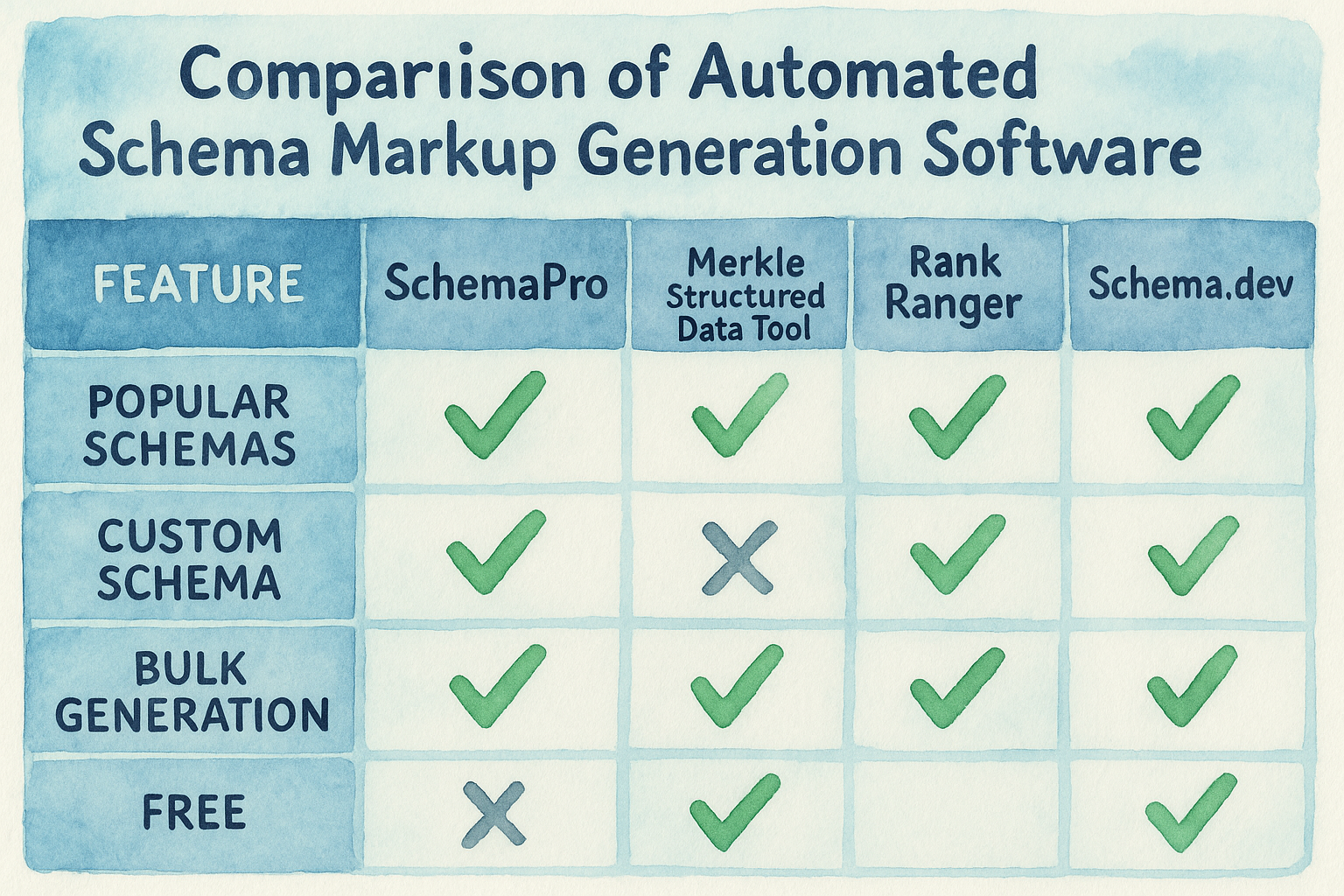
Before selecting a platform, consider technical support availability, scalability, and analytics capabilities to measure schema impact on SEO performance. For example, Milestone’s Schema Performance Analytics platform offers detailed reporting and incremental insights to optimize your markup continually.[Source]
How Do You Monitor and Maintain Automated Schema Markup?
Deploying schema markup is just the beginning. Continuous monitoring and maintenance are essential for sustained SEO success.
Here are best practices for managing automated schema markup effectively:
- Regular Validation: Use tools like Google’s Rich Results Test and Schema.org validator to check for errors or warnings in your schema markup.
- Automated Monitoring: Leverage your schema automation platform’s built-in monitoring to detect issues caused by content changes or schema vocabulary updates.
- Ongoing Updates: Update schema types and properties as new versions release. Automated solutions typically handle this, but manual reviews ensure accuracy.
- Performance Tracking: Analyze how your schema markup influences traffic, CTR, and rankings using analytics platforms. Identify which schema types deliver the highest returns.
- Team Alignment: Make schema maintenance a shared responsibility among content creators, SEO specialists, and developers to ensure consistency and accuracy.
Automation tools like Schema App offer continuous schema updating as content changes in CMS environments, reducing manual maintenance overhead.[Source]
Remember, schema errors can negatively impact your indexing and rich result appearance, so proactive maintenance safeguards your investment.
Can Automated Schema Markup Support Large Enterprises Effectively?
Large enterprises often face unique challenges in schema markup management due to:
- Thousands of pages with diverse content types.
- Multiple digital properties and language versions.
- Complex content workflows involving various teams and CMS platforms.
Automated schema markup generation is perfectly suited for these environments, offering:
- Scalable Deployment: AI-driven tools can annotate large volumes of pages with precision and speed.
- Dynamic Updates: Automated solutions adjust schema in real-time as content evolves across enterprise sites.
- Integration with Enterprise CMS: Tools like Schema App specialize in Sitecore integration, a popular enterprise CMS, enabling seamless markup management within existing workflows.[Source]
- Strategic Content Recommendations: Based on schema performance data, enterprises receive actionable guidance to optimize content and expand schema usage.
- Comprehensive Reporting: Enterprise-grade analytics platforms measure the ROI of schema deployment and inform continuous improvement.
Case studies such as Sharp Healthcare demonstrate how automated schema solutions empowered effective data migration and SEO performance improvement at scale.[Source]
What Are the Steps to Implement Automated Schema Markup on a CMS Like Sitecore?
Sitecore is a powerful enterprise CMS, but it presents challenges for manual schema implementation due to its extensive customization and dynamic content capabilities.
Here’s how an automation-first approach can smooth the journey:
- Define Your Goals and Schema Strategy: Align your SEO objectives with the types of schema that best reflect your content and user intent.
- Author Schema Using a Dedicated Tool: Tools like Schema App provide a "Highlighter" which lets you select page elements and map them to schema properties visually. This creates reusable templates that automatically apply to pages with similar structures.
- Integrate Schema Markup Deployment: Implement schema via JavaScript tags or tag manager setups so that markup is injected dynamically without manual HTML edits.
- Ensure Dynamic Updates: The automation tool detects content updates in Sitecore and refreshes the schema markup in real-time, keeping structured data current and accurate.
- Monitor and Optimize: Use built-in analytics and ongoing support from your Schema App Customer Success Manager to refine the schema strategy over time.
This approach avoids the labor-intensive manual coding model, providing scalability, error reduction, and strategic SEO optimization.[Source]
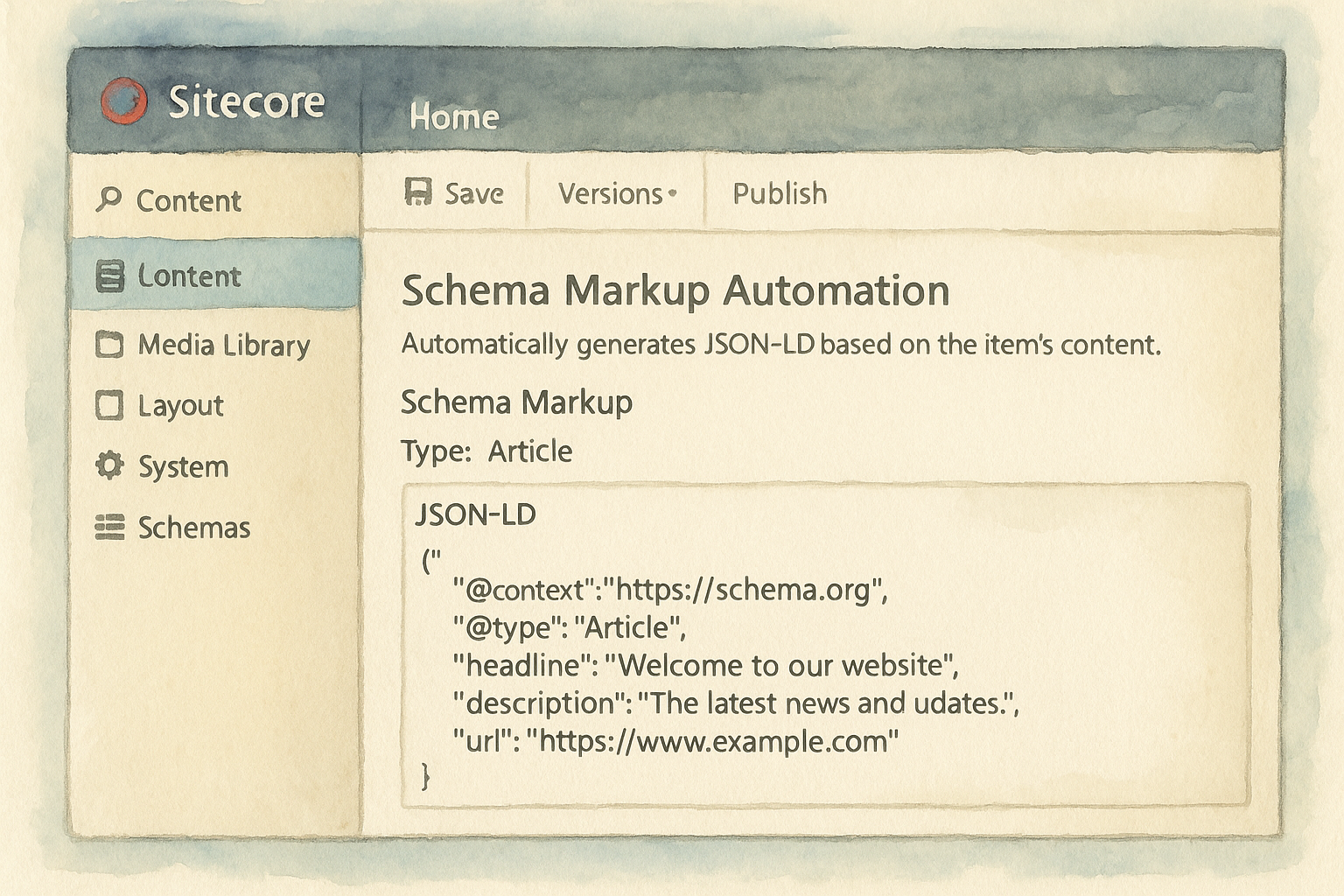
How Can You Measure the Impact of Automated Schema Markup?
Measuring schema markup impact involves tracking how your structured data influences search performance and user engagement metrics. Here are key metrics and methods:
- Organic Traffic Changes: Analyze growth in organic sessions and page views via Google Analytics or similar tools after deploying automated schema.
- Click-Through Rates (CTR): Monitor improvements in CTR on pages with rich snippets or enhanced search features using Google Search Console’s performance reports.
- Rich Result Visibility: Track how often your pages appear with rich snippets, FAQ carousels, knowledge panels, or other schema-driven features in search results.
- Keyword Rankings: Observe gains in rankings for target keywords that schema helps better contextualize.
- Schema Validation Reports: Use automated monitoring dashboards to identify schema errors and warnings to maintain consistent quality.
- Return on Investment (ROI) Calculations: Some schema management tools help calculate the expected or actual ROI on your structured data strategy by correlating SEO growth and conversion data.[Source]
Combining these insights provides a holistic view of how automated schema markup fuels SEO success and informs future optimization.
Can Automated Schema Markup Help With SEO for International Websites?
Yes, automated schema markup generation offers important advantages for international SEO:
- Localized Content Markup: Schema types like
LocalBusinesswith country-specific address and contact details can be auto-applied to different geographic pages. - Multilingual Schema Implementation: Automation tools can generate schema markup that reflects language variants and alternate URLs, helping search engines understand hreflang relationships.
- Consistent Markup Across Regions: Automation ensures uniform schema deployment across country-specific subdomains or directories, preventing errors and discrepancies.
- Compliance With Regional Schema Requirements: Schema vocabularies may have local nuances. Automated tools can update to reflect regional schema updates or standards.
This ability to scale and maintain structured data across global content portfolios maintains organic visibility internationally and supports localized search performance.
How Can Automated Schema Markup Be Integrated Effectively with Your Existing SEO Strategy?
Schema markup complements and amplifies many aspects of your SEO efforts. To integrate it effectively, consider these tactics:
- Combine With Keyword and Content Strategy: Use insights from keyword research and content audits to guide schema types selection, targeting the most valuable entities for your audience.
- Link Schema With User Journey Optimization: Schema-enhanced pages often bring higher engagement. Align schema deployment with pages critical for conversions, such as product or service detail pages.
- Leverage Analytics for Continuous Improvement: Use schema performance data to identify underperforming pages or missed schema opportunities, then update content or markup accordingly.
- Integrate With Technical SEO Audits: Include schema validation and error checks within your regular SEO audit workflows to detect and fix issues promptly.
- Utilize Automation for Efficiency: Deploy automated schema generation tools alongside other AI SEO tools that optimize metadata, internal linking, and content creation for a cohesive tech stack.[Internal Link]
By treating schema markup as a strategic pillar rather than an isolated task, you maximize its impact on your website’s discoverability and user experience.
What Are the Future Trends in Automated Schema Markup Generation?
Emerging search technologies and growing AI capabilities are driving exciting trends in schema automation:
- Deeper AI Semantic Understanding: Upcoming tools will perform more granular analysis of page content to generate context-rich, nested schema structures that better mimic human understanding.
- Real-Time Schema Updates: Integration with headless CMS and dynamic content platforms will enable instantaneous schema refreshes as content edits happen.
- Expanded Schema Types for AI Search: As AI-generated answers become mainstream, schema will evolve to support entity disambiguation and encourage richer knowledge graphs in search results.[Source]
- Automatic Schema Suggestions: Intelligent platforms will proactively recommend new schema types for emerging content formats and search features, streamlining SEO planning.
- Cross-Channel Structured Data: Schema may become integral not only to web but voice, video, and augmented reality content, demanding unified multi-format automation solutions.
- Increased Use of Schema in Local and Geo SEO: More focus on local business and service schemas to address hyperlocal search queries effectively,[Internal Link] supporting regional marketing strategies.
Frequently Asked Questions About Automated Schema Markup Generation
What is the best format for implementing schema markup?
JSON-LD is the preferred format for schema markup. It is lightweight, separate from HTML code, easy to maintain, and widely supported by search engines.[Source]
Can automated schema markup replace manual coding completely?
Automated schema markup significantly reduces the need for manual coding but expert oversight is still beneficial to handle complex or unique content cases.
How often should I update my schema markup?
Schema should be kept current with website content changes and schema.org vocabulary updates. Automated tools help maintain this in real-time or with scheduled regularity.
Which schema types are most important for ecommerce sites?
Product, Review, Offer, and AggregateRating schemas are vital for ecommerce, helping with rich snippets such as price, availability, and user ratings.
Is automated schema markup generation useful for small businesses?
Absolutely. Small businesses benefit from automation by gaining rich search features with limited technical resources, especially for local business and FAQ schemas.
What's Your Next Step?
Tell us in the comments: How will you apply automated schema markup generation to enhance your SEO strategy? For expert guidance and more detailed tactics, explore our step-by-step guide on automating SEO content creation and how local SEO strategies can amplify your presence.
To explore complementary content marketing and user experience tips, don’t miss our piece on how a UX writing agency transforms user experience.